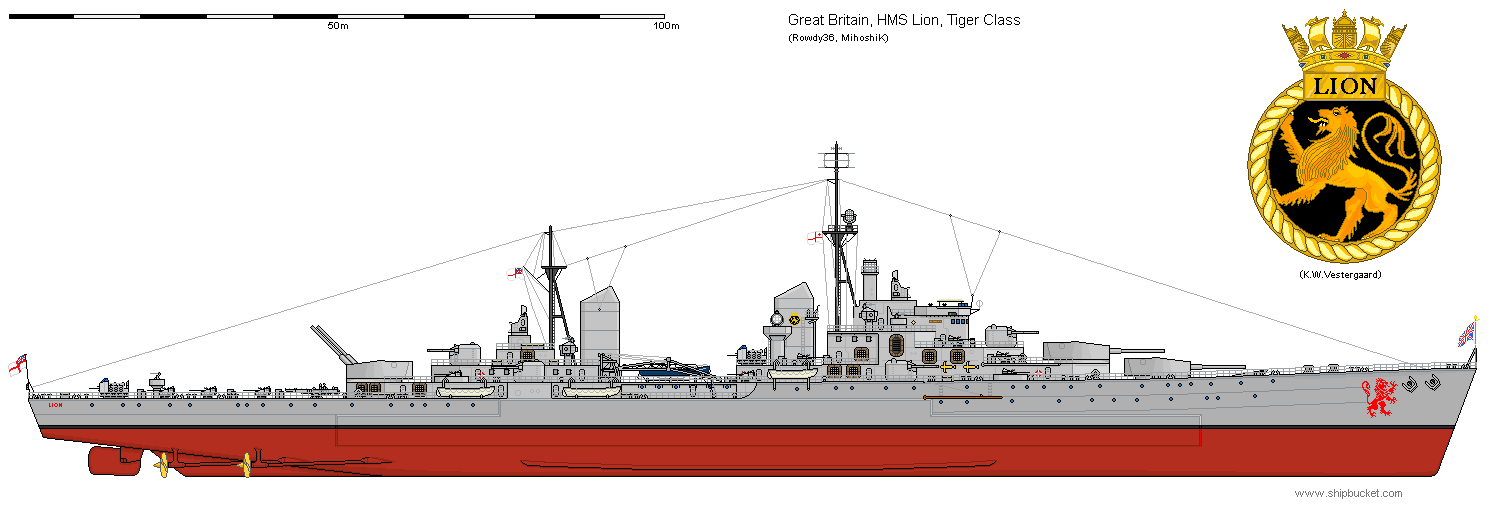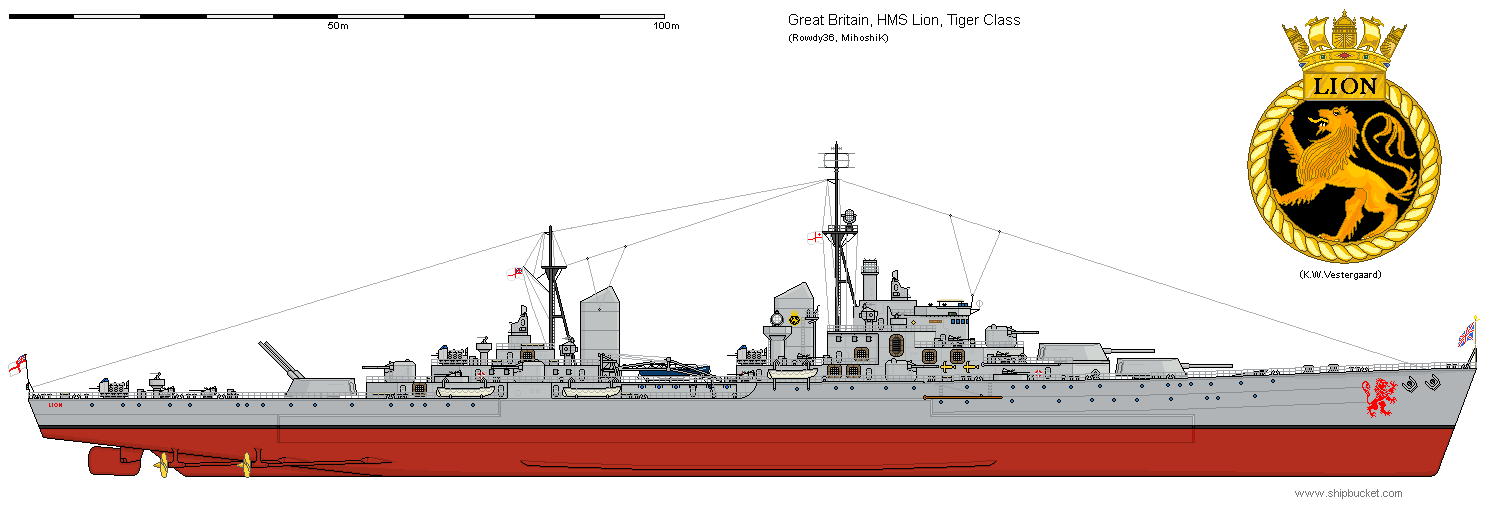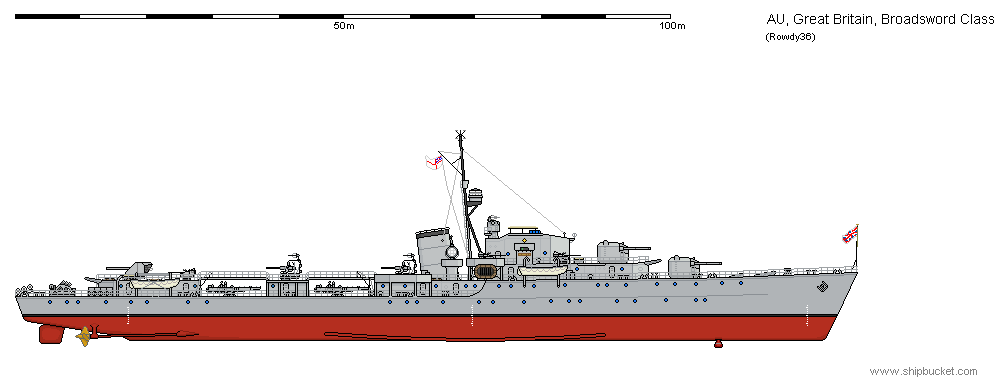The Deutschland Class Revolution
Moderator: Community Manager
-
emperor_andreas
- Posts: 3908
- Joined: November 17th, 2010, 8:03 am
- Location: Corinth, MS USA
- Contact:
Re: The Deutschland Class Revolution
Very nice work!
Re: The Deutschland Class Revolution
HMS Warrior and HMS Minotaur 1943-44.
Like most of the British capital ships of the time, Minotaur and Warrior had their aircraft handling facilities removed during 1943. This allowed the afterbridge to be rebuilt with even more enhanced AA. When completed in 1934 they had two 8 barrel pom poms, this increased to four after their 1939 refits, and increased again to six after 1943. Enhanced and updated electronic outfits were fitted to get them ready for service in the Pacific as escorts to the big carriers.

I will have to have a think about some suitable ends for these two ships. A bit more about service first maybe. Kill a couple of Japanese cruisers maybe. Enhanced radar versus mark one eyeball.
The Battle of Vinh Nguyen.
Setting: South China Sea, off the coast of Vietnam. (Allies acting on radio intercepts.)
The Japanese were running Operation Kita, where the battleships Hyuga and Ise, cruiser Oyodo and three destroyers were to transit from Singapore to Japan carrying a range of fuels, scarce metals and other resources badly needed by the Japanese Homeland Industries.
A range of Allied submarines were laid in wait for the Japanese ships with a back-up force of British ships waiting in the South China Sea to intercept the remaining ships after the submarines had had their way with them.
With Admiral Vian in command on board the Battleship, Duke Of York (12x15"), accompanied by the Warrior and Minotaur, with the light cruisers Jamaica and New Zealand (9x6"), and six brand new U and V class destroyers (6x4.7"). All ships could make 30 knots or more. This Squadron was considered more than enough to take care of the Japanese force.
The submarine Tantalus reported the Japanese force leaving Singapore and tried to get into position for an attack. However the Japanese ships were moving at 22 knots and the Tantalus fell behind. This same event happened to several other US and UK submarines that tried to intercept the Japanese force only to find themselves behind and falling further behind as the Japanese sped off into the night. Inclement weather also made the submarines task that much harder. It also transpired after the event that the Japanese were using radar detectors that allowed them to plot where the subs were and alter course to make their interceptions almost impossible.
Once it looked like the submarines were not going to be able to make the interception of the Japanese force, Admiral Vian ordered his ships into there search positions and headed for the calculated interception point of Camranh Bay on the coast of Vietnam. Even Admiral Vian had slightly miscalculated but was kept up to date by position updates from those submarines still in contact with the Japanese ships. A course correction was made that would intercept the Japanese force north of Camranh Bay and speed was increased to 25 knots. Two hours later the report of 'Contact' is received from Jamaica at the point position of the line. More reports followed with the layout of the Japanese line. Firing orders were given. The idea was to overwhelm the cruiser and destroyers first to put their 24" torpedoes out of action. Those torpedoes were the Joker in the pack that could turn the battle against the British if the Japanese were able to launch. Admiral Vian ordered "Execute" and the slaughter began. Duke of Yorks gunnery radar had been plotting the Oyodos position for the last 20 minutes and had the range down to the yard. The eerie view of the guns firing with flashless powder went up and down the line. Four of Duke of Yorks first four shells hit the Oyodo, followed by huge gouts of flame as the deck cargo of petroleum products in cans exploded. These explosions turned the immediate area around the Japanese ships as bright as day. Another salvo from the big ships and the Japanese ships were aflame from bow to stern. Admiral Vian ordered "Change target to the Battleships".
Admiral Vians mistake was to cost the British dearly. One destroyer, though damaged enough to later sink, had managed to swing one set of torpedoes out and virtually fire blind at the indistinct British line. One more salvo on the light ships could have prevented the Minotaur from receiving three torpedo hits. The first two hits were on the armoured belt and while causing large damage, the ship might have survived. It was the third hit at the end of the armour aft that was the fatal one. In designing their Torpedo Defense Systems, the British had only taken into account the standard torpedos with 250-300kg warheads. This was no match for the 500kg Long Lance torpedoes of the Japanese. That hit aft exploded into the aft magazine and like many a British battlecruiser before it, the Minotaur blew up. The ship split in half, the aft section sinking almost immediately while the forward section stayed afloat long enough for HMNZS New Zealand to go along side and take aboard the survivors.
Meanwhile The Duke of York was rapidly turning the Hyuga into a blazing colander, its 15" guns taking deadly toll. The Warrior and Jamaica were doing the same to the Ise. The Jamaica's 6" guns exploding amongst the deck cargo and the cargo stored in the huge hangar aft. With such bright targets to fire at almost every shot was a hit. The whole battle from the opening salvo to the last took only 45 minutes. Only the loss of the Minotaur spoiled what should have been a text book victory. It was still a resounding victory 6 Japanese ships sunk for only one British loss was pretty decisive.
Admiral Vian withdrew back out to sea to meet the rest of the British Pacific Fleet. Air cover arriving over the ships at dawn in case Japanese aircraft found the withdrawing ships before they could rejoin the safety of the Fleet.
Very few Japanese were rescued, the fires from the ships cargo set fire to the fuel oil from the ships bunkers which incinerated those crew that managed to get overboard into the sea. Those that did survive had managed to launch boats and rafts to get them away from the ships.
This was the last attempt by the Japanese to force the US blockade of the Home Islands.
Like most of the British capital ships of the time, Minotaur and Warrior had their aircraft handling facilities removed during 1943. This allowed the afterbridge to be rebuilt with even more enhanced AA. When completed in 1934 they had two 8 barrel pom poms, this increased to four after their 1939 refits, and increased again to six after 1943. Enhanced and updated electronic outfits were fitted to get them ready for service in the Pacific as escorts to the big carriers.
I will have to have a think about some suitable ends for these two ships. A bit more about service first maybe. Kill a couple of Japanese cruisers maybe. Enhanced radar versus mark one eyeball.
The Battle of Vinh Nguyen.
Setting: South China Sea, off the coast of Vietnam. (Allies acting on radio intercepts.)
The Japanese were running Operation Kita, where the battleships Hyuga and Ise, cruiser Oyodo and three destroyers were to transit from Singapore to Japan carrying a range of fuels, scarce metals and other resources badly needed by the Japanese Homeland Industries.
A range of Allied submarines were laid in wait for the Japanese ships with a back-up force of British ships waiting in the South China Sea to intercept the remaining ships after the submarines had had their way with them.
With Admiral Vian in command on board the Battleship, Duke Of York (12x15"), accompanied by the Warrior and Minotaur, with the light cruisers Jamaica and New Zealand (9x6"), and six brand new U and V class destroyers (6x4.7"). All ships could make 30 knots or more. This Squadron was considered more than enough to take care of the Japanese force.
The submarine Tantalus reported the Japanese force leaving Singapore and tried to get into position for an attack. However the Japanese ships were moving at 22 knots and the Tantalus fell behind. This same event happened to several other US and UK submarines that tried to intercept the Japanese force only to find themselves behind and falling further behind as the Japanese sped off into the night. Inclement weather also made the submarines task that much harder. It also transpired after the event that the Japanese were using radar detectors that allowed them to plot where the subs were and alter course to make their interceptions almost impossible.
Once it looked like the submarines were not going to be able to make the interception of the Japanese force, Admiral Vian ordered his ships into there search positions and headed for the calculated interception point of Camranh Bay on the coast of Vietnam. Even Admiral Vian had slightly miscalculated but was kept up to date by position updates from those submarines still in contact with the Japanese ships. A course correction was made that would intercept the Japanese force north of Camranh Bay and speed was increased to 25 knots. Two hours later the report of 'Contact' is received from Jamaica at the point position of the line. More reports followed with the layout of the Japanese line. Firing orders were given. The idea was to overwhelm the cruiser and destroyers first to put their 24" torpedoes out of action. Those torpedoes were the Joker in the pack that could turn the battle against the British if the Japanese were able to launch. Admiral Vian ordered "Execute" and the slaughter began. Duke of Yorks gunnery radar had been plotting the Oyodos position for the last 20 minutes and had the range down to the yard. The eerie view of the guns firing with flashless powder went up and down the line. Four of Duke of Yorks first four shells hit the Oyodo, followed by huge gouts of flame as the deck cargo of petroleum products in cans exploded. These explosions turned the immediate area around the Japanese ships as bright as day. Another salvo from the big ships and the Japanese ships were aflame from bow to stern. Admiral Vian ordered "Change target to the Battleships".
Admiral Vians mistake was to cost the British dearly. One destroyer, though damaged enough to later sink, had managed to swing one set of torpedoes out and virtually fire blind at the indistinct British line. One more salvo on the light ships could have prevented the Minotaur from receiving three torpedo hits. The first two hits were on the armoured belt and while causing large damage, the ship might have survived. It was the third hit at the end of the armour aft that was the fatal one. In designing their Torpedo Defense Systems, the British had only taken into account the standard torpedos with 250-300kg warheads. This was no match for the 500kg Long Lance torpedoes of the Japanese. That hit aft exploded into the aft magazine and like many a British battlecruiser before it, the Minotaur blew up. The ship split in half, the aft section sinking almost immediately while the forward section stayed afloat long enough for HMNZS New Zealand to go along side and take aboard the survivors.
Meanwhile The Duke of York was rapidly turning the Hyuga into a blazing colander, its 15" guns taking deadly toll. The Warrior and Jamaica were doing the same to the Ise. The Jamaica's 6" guns exploding amongst the deck cargo and the cargo stored in the huge hangar aft. With such bright targets to fire at almost every shot was a hit. The whole battle from the opening salvo to the last took only 45 minutes. Only the loss of the Minotaur spoiled what should have been a text book victory. It was still a resounding victory 6 Japanese ships sunk for only one British loss was pretty decisive.
Admiral Vian withdrew back out to sea to meet the rest of the British Pacific Fleet. Air cover arriving over the ships at dawn in case Japanese aircraft found the withdrawing ships before they could rejoin the safety of the Fleet.
Very few Japanese were rescued, the fires from the ships cargo set fire to the fuel oil from the ships bunkers which incinerated those crew that managed to get overboard into the sea. Those that did survive had managed to launch boats and rafts to get them away from the ships.
This was the last attempt by the Japanese to force the US blockade of the Home Islands.
Last edited by Krakatoa on July 7th, 2015, 7:07 pm, edited 1 time in total.
Re: The Deutschland Class Revolution
Not taking into account the crippled Myoko and Takao stuck in Singapore, your Warrior has high probabilities of engaging and sink IJN Haguro. Even IJN Ashigara if you want to steal her from Trenchant.
Otherwise you might try to depart from the Philippines in order to intercept the ships of Operation Kita, but in that case you'll have to face not only Oyodo, but also Ise and Hyuuga.
Otherwise you might try to depart from the Philippines in order to intercept the ships of Operation Kita, but in that case you'll have to face not only Oyodo, but also Ise and Hyuuga.
My Worklist
Sources and documentations are the most welcome.
-Koko Kyouwakoku (Republic of Koko)
-Koko's carrier-based aircrafts of WWII
-Koko Kaiun Yuso Kaisha - KoKaYu Line (Koko AU spinoff)
-Koko - Civil Aviation
Sources and documentations are the most welcome.
-Koko Kyouwakoku (Republic of Koko)
-Koko's carrier-based aircrafts of WWII
-Koko Kaiun Yuso Kaisha - KoKaYu Line (Koko AU spinoff)
-Koko - Civil Aviation
Re: The Deutschland Class Revolution
Thanks for the ideas BB1987, operation Kita sounds tailor made for a night interception off the coast of Vietnam 11-12 February 1945. Have to have a think about force composition.
Japanese as per real life.
British,
1 x BB
2 x BC
2 x CL
6 x DD
Could be an interesting encounter with shoals of torpedoes flooding both ways.
I might have a new weapon I have been thinking about for the British to give it a trial.
Japanese as per real life.
British,
1 x BB
2 x BC
2 x CL
6 x DD
Could be an interesting encounter with shoals of torpedoes flooding both ways.
I might have a new weapon I have been thinking about for the British to give it a trial.
-
MihoshiK
- Posts: 1035
- Joined: October 16th, 2010, 11:06 pm
- Location: In orbit, watching you draw.
- Contact:
Re: The Deutschland Class Revolution
Allow me to throw my two cents in.
Triple 9.2" turrets, and almost exactly the dimensions of the 1940 Lillicrap design. Obviously an end-of-war ship, considering the 40 mm turrets.

Edit: That damn lion took ages.
Edit 2:
Alternatively, for those not liking the raised aft turret:

Triple 9.2" turrets, and almost exactly the dimensions of the 1940 Lillicrap design. Obviously an end-of-war ship, considering the 40 mm turrets.

Edit: That damn lion took ages.
Edit 2:
Alternatively, for those not liking the raised aft turret:

Last edited by MihoshiK on July 8th, 2015, 8:02 pm, edited 2 times in total.
Would you please not eat my gun...


Re: The Deutschland Class Revolution
Now that is a warship! Question, why the raised guns in the aft turret? Just abit odd to see
Re: The Deutschland Class Revolution
I think it might be so you can see that like the triple 6", these 9.2" turrets have the centre gun set back further than the outer ones.
It was I that queried Mihoshik on the deck penetration of the 9.2" aft. Raising it level with the main deck would take care of that problem. But what do I know, someone like Hood or Smurf may have more knowledge of the in and outs of turret placement for the Tiger class.
It was I that queried Mihoshik on the deck penetration of the 9.2" aft. Raising it level with the main deck would take care of that problem. But what do I know, someone like Hood or Smurf may have more knowledge of the in and outs of turret placement for the Tiger class.
-
emperor_andreas
- Posts: 3908
- Joined: November 17th, 2010, 8:03 am
- Location: Corinth, MS USA
- Contact:
Re: The Deutschland Class Revolution
Very nice work!
-
MihoshiK
- Posts: 1035
- Joined: October 16th, 2010, 11:06 pm
- Location: In orbit, watching you draw.
- Contact:
Re: The Deutschland Class Revolution
Of course, if you have a high-speed, long ranged ship to hunt down enemy raiders with, it helps if you have equally long ranged and high speed escorts for that ship, as a screening force.
So as a companion ship to the Tiger class:

So as a companion ship to the Tiger class:

Would you please not eat my gun...


-
MihoshiK
- Posts: 1035
- Joined: October 16th, 2010, 11:06 pm
- Location: In orbit, watching you draw.
- Contact:
Re: The Deutschland Class Revolution
Actually, with such large guns, the deck penetration might be sufficient to interfere with the prop shafts. So that's a good excuse to raise the aft turret. Also, it kinda looks niceKrakatoa wrote:I think it might be so you can see that like the triple 6", these 9.2" turrets have the centre gun set back further than the outer ones.
It was I that queried Mihoshik on the deck penetration of the 9.2" aft. Raising it level with the main deck would take care of that problem. But what do I know, someone like Hood or Smurf may have more knowledge of the in and outs of turret placement for the Tiger class.
Also, it allows the armored belt to be somewhat shorter.
Aand I just realized what I can do with that empty space aft of the raised turret.
Would you please not eat my gun...


